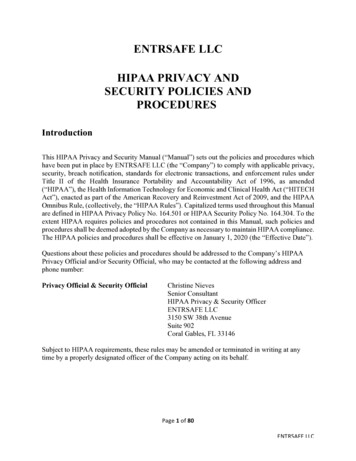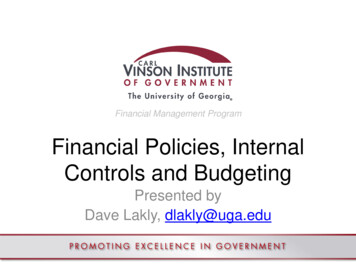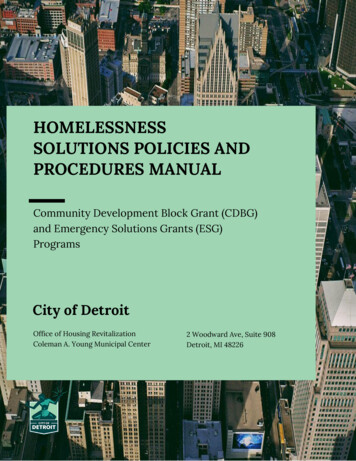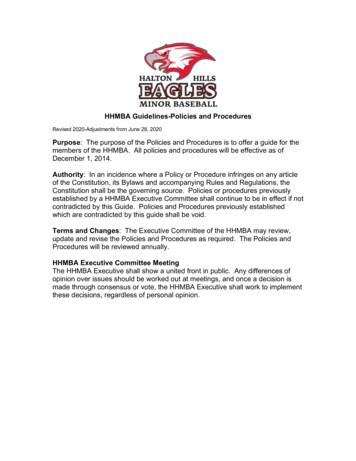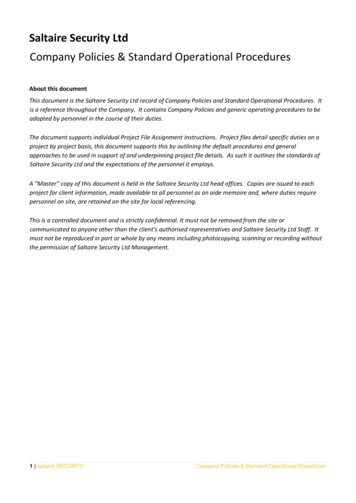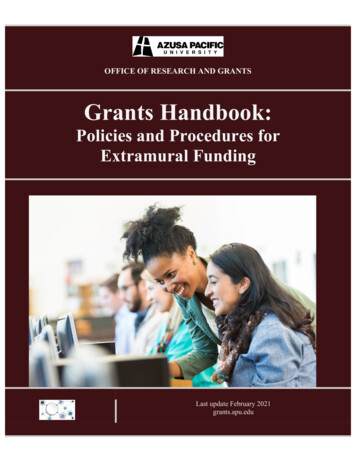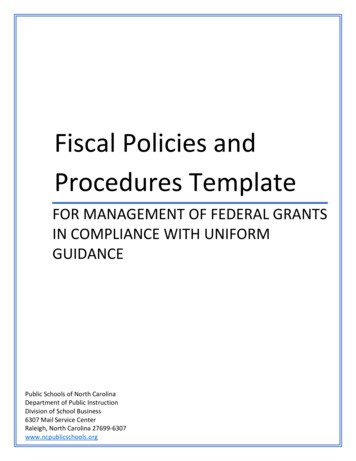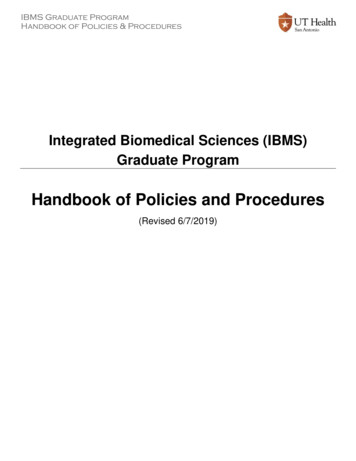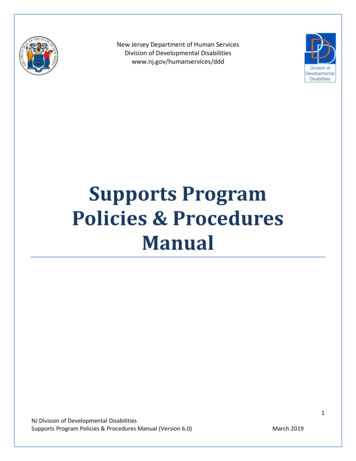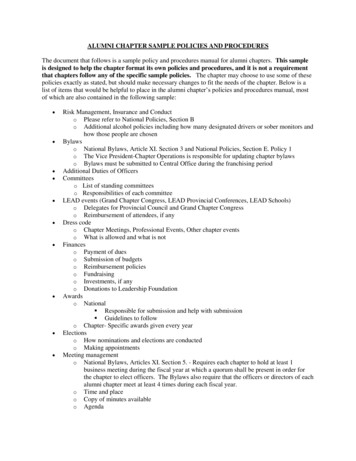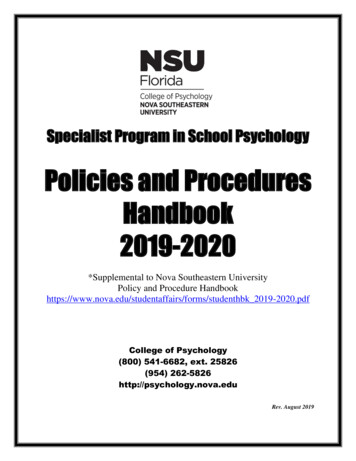
Transcription
Specialist Program in School PsychologyPolicies and ProceduresHandbook2019-2020*Supplemental to Nova Southeastern UniversityPolicy and Procedure studenthbk 2019-2020.pdfCollege of Psychology(800) 541-6682, ext. 25826(954) 262-5826http://psychology.nova.eduRev. August 2019
TABLE OF CONTENTSDepartment Chair’s Message .1Academic Calendar .3Specialist Program in School Psychology .11Program Philosophy.11Program Goals and Objectives .12Florida Educator Accomplished Practices .22ESOL Requirement .22Admission Requirements .25Minimum Requirements for Admission .25Specialist Program (Psy.S.) .25Alternative Admission Route .26Provisional Admission .26TOEFL Requirement .26Foreign Coursework .26Transfer of Credits .26Degree Candidacy.27Curriculum & Degree Completion Requirements .29Certification/Licensure .29Coursework .30En.Route M.S. in School Psychology .31Comprehensive Examinations .31Program Curriculum .33Sample 4-Year Course Sequence .34Sample 3-Year Course Sequence .35Course Descriptions .36Applied Training .41School Psychology Practica .41School Psychology Internship .42Academic Regulations & Information .45Calendar and Classes .45Academic Year .45Attendance .45Candidate Enrollment .45Residency and Full-Time Status .45Leave of Absence .46Time Limits .46Failure to Register .47Matriculation Requirements (Degree Candidacy) .47Advisement .48Orientation .48Academic Advisement .48Peer Mentoring .48Candidate Retention and Progression .49Academic Standing .50Probation.50Dismissal .51Readmission .51Remediation Policy .51Remediation Guidelines .51Annual Review . 53Grading Policy . 53Policy for Grading Disputes . 54Registration . 55Registration Policies and Procedures . 55Payment of Tuition and Fees . 55Tuition and Fees for the Academic Year . 56Professional Liability Insurance . 56Refund Policy . 57Class Cancellation Policy . 57Drop/Add & Refund Schedule . 57Withdrawal from a Course . 57Auditing a Course. 58Transfer of Credit . 58Provisional Admissions . 59Degree Conferral . 59Graduation . 60Core Performance Standards for Progress . 61Candidate Conduct . 63Professional Standing Committee . 63Candidate Rights and Responsibilities . 65Ethical Issues in the School Psychology Programs . 65Dual Relationships Between Faculty & Candidates . 66No Direct Payment to Faculty . 67Candidate Grievances and Appeals . 68Informal Procedure . 68Formal Procedure . 68Other Policies and Information . 71College of Psychology Student Aid Programs . 71Scholarships . 71Assistantships . 71Student Employment . 71Student Facilities . 71College of Psychology Testing Library . 71Main Campus Mailboxes. 71Notice (Bulletin) Boards . 71College of Psychology Organization. 73Department Administration . 73School Psychology Administration . 73Full-Time Faculty & Professional Interests . 74Professors Emeriti . 78Contributing Faculty from Other Colleges . 79Part-Time Core Faculty . 79Clinical Faculty . 80School Psychology Adjunct Faculty . 81Important Telephone Numbers . 82College of Psychology Phone/Email List . 83i
iii
Department Chair’s MessageAs Chair of the Department of Clinical and School Psychology, it is my pleasure towelcome you to our programs for the 2019-2020 academic year. We are part of the Collegeof Psychology that offers bachelor’s degrees in psychology and behavioral neuroscienceand graduate programs in clinical psychology, school psychology, counseling,experimental psychology, forensic psychology and general psychology.I take pride in working in an environment that is inclusive. Our commitment to diversityis an essential core value throughout the various programs in the department. To that end,we endeavor to provide an atmosphere and curriculum appropriate to the mandates of aculturally diverse society. With an eclectic mix of students, and faculty, and a wide rangeof curriculum and practicum experiences we enrich the understanding of educational andpsychological principles and their applications. I am especially proud of our first-ratefaculty, many of whom are nationally and internationally known. Interacting with yourprofessors who have developed their professional identity and continue to expand theirexpertise in assessment, diagnosis, intervention, and research will provide the milieu foryou to be mentored into the professional world.We provide a wide range of training, throughout the programs, in various theoreticalperspectives that link directly to the delivery of clinical and school psychologyinterventions. Our concentrations and tracks provide the prospect to gain specific expertisein a wide range of specialty areas. In addition, there are numerous opportunities availableoutside of your classroom, through active participation in the many student groups in thedepartment and university, and community-based projects.I encourage you to explore the wide range of experiences that are available to you whileenrolled in your program. Get to know your classmates who will become an integral partof your journey at NSU and in many instances will become part of your professionalnetwork after graduation. With all the experiences that will come your way in the next fewyears, I urge you to discover and develop your passion in pursuing your path to professionalcompetence.Welcome to the department, and good luck pursuing your goals and dreams.John E. Lewis, Ph.D.Chair, Dept. of Clinical & School Psychology1
2
SCHOOL PSYCHOLOGY PROGRAMSACADEMIC CALENDAR 2019-2020Fall 2019 – Full SemesterThursday, August 15Orientation for new on-campus studentsMonday, August 19Fall semester classes beginLast day for completing regular registrationLate registration fee of 50 will be charged after this dateSunday, August 25End of 100% refundLast day for completing late registrationLast day for adding classesSunday, September 1End of 75% refundMonday, September 2Labor Day – university offices closedSunday, September 8End of 50% refundSunday, September 15End of 25% refundLast day for dropping classes with refundSunday, November 17Last day to withdraw from classes (no refund)Thursday, November 28Friday, November 29Thanksgiving – university offices closedSunday, December 8Fall semester classes endMonday, December 23 –Wednesday, January 1Winter Holiday – university offices closed3
Fall I 2019 (8-Week / Intensive Weekend Format)Monday, August 19Sunday, August 25Sunday, September 1Monday, September 2Sunday, September 8September 13, 14, 15Sunday, September 15Sunday, September 22October 11, 12, 13Sunday, October 13Fall I classes beginLast day for completing regular registrationLate registration fee of 50 will be charged after this dateEnd of 100% refundLast day for completing late registrationLast day for adding classesEnd of 75% refundLabor Day – university offices closedEnd of 50% refundIntensive weekend-format class meetingEnd of 25% refundLast day for dropping classes with refundLast day to withdraw from classes (no refund)Intensive weekend-format class meetingFall I classes endFall II 2019 (8-Week / Intensive Weekend Format)Monday, October 14Sunday, October 20Sunday, October 27November 1, 2, 3Sunday, November 3Sunday, November 10Sunday, November 17Thursday, November 28Friday, November 29December 6, 7, 8Sunday, December 8Fall II classes beginLast day for completing regular registrationLate registration fee of 50 will be charged after this dateEnd of 100% refundLast day for completing late registrationLast day for adding classesEnd of 75% refundIntensive weekend-format class meetingEnd of 50% refundEnd of 25% refundLast day for dropping classes with refundLast day to withdraw from classes (no refund)Thanksgiving – university offices closedIntensive weekend-format class meetingFall II semester classes end4
Winter 2020 – Full SemesterMonday, December 23 –Wednesday, January 1Winter Holiday – university offices closedThursday, January 2University offices reopenMonday, January 6Winter semester classes beginLast day for completing regular registrationLate registration fee of 50 will be charged after this dateSunday, January 12End of 100% refundLast day for completing late registrationLast day for adding classesSunday, January 19End of 75% refundMonday, January 20Martin L. King, Jr. Day – university offices closedSunday, January 26End of 50% refundSunday, February 2End of 25% refundLast day for dropping classes with refundMarch 2 – March 6Spring BreakSunday, April 12Last day to withdraw from classes (no refund)Sunday, May 3Winter semester classes end5
Winter I 2020 (8-Week / Intensive Weekend Format)Monday, January 6Sunday, January 12Sunday, January 19Monday, January 20Sunday, January 26January 31, February 1, 2Sunday, February 2Sunday, February 9February 28, 29, March 1Sunday, March 1Winter I classes beginLast day for completing regular registrationLate registration fee of 50 will be charged after this dateEnd of 100% refundLast day for completing late registrationLast day for adding classesEnd of 75% refundMartin L. King, Jr. Day – university offices closedEnd of 50% refundIntensive weekend-format class meetingEnd of 25% refundLast day for dropping classes with refundLast day to withdraw from classes (no refund)Intensive weekend-format class meetingWinter I classes endWinter II 2020 (8-Week / Intensive Weekend Format)Monday, March 9Sunday, March 15Sunday, March 22Sunday, March 29April 3, 4, 5Sunday, April 5Sunday, April 12May 1, 2, 3Sunday, May 3Winter II classes beginLast day for completing regular registrationLate registration fee of 50 will be charged after this dateEnd of 100% refundLast day for completing late registrationLast day for adding classesEnd of 75% refundEnd of 50% refundIntensive weekend-format class meetingEnd of 25% refundLast day for dropping classes with refundLast day to withdraw from classes (no refund)Intensive weekend-format class meetingWinter II semester classes end6
Summer 2020 – Full SemesterMonday, May 4Summer semester classes beginLast day for completing regular registrationLate registration fee of 50 will be charged after this dateSunday, May 10End of 100% refundLast day for completing late registrationLast day for adding classesSunday, May 17End of 75% refundSunday, May 24End of 50% refundMonday, May 25Memorial Day – university offices closedSunday, May 31End of 25% refundLast day for dropping classes with refundFriday, July 3Independence Day (Observed) – university offices closedSaturday, July 4Independence Day – university offices closedSunday, July 19Last day to withdraw from classes (no refund)Sunday, August 9Summer semester classes end7
Summer I 2020 (8-Week / Intensive Weekend Format)Monday, May 4Sunday, May 10Sunday, May 17Sunday, May 24Monday, May 25May 29, 30, 31Sunday, May 31June 19, 20, 21Sunday, June 21Summer I classes beginLast day for completing regular registrationLate registration fee of 50 will be charged after this dateEnd of 100% refundLast day for completing late registrationLast day for adding classesEnd of 75% refundEnd of 50% refundMemorial Day – university offices closedIntensive weekend-format class meetingEnd of 25% refundLast day for dropping classes with refundLast day to withdraw from classesIntensive weekend-format class meetingSummer I classes endSummer II 2020 (8-Week / Intensive Weekend Format)Monday, June 22Sunday, June 28Friday, July 3Saturday, July 4Sunday, July 5July 10, 11, 12Sunday, July 12Sunday, July 19August 7, 8, 9Sunday, August 9Summer II semester classes beginLast day for completing regular registrationLate registration fee of 50 will be charged after this dateEnd of 100% refundLast day for completing late registrationLast day for adding classesIndependence Day (Observed) – university offices closedIndependence Day – university offices closedEnd of 75% refundIntensive weekend-format class meetingEnd of 50% refundEnd of 25% refundLast day for dropping classes with refundLast day to withdraw from classesIntensive weekend-format class meetingSummer II semester classes end8
Specialist & Doctoral Programs in School Psychology8-Week / Intensive Weekend Classes Meeting DatesFall 2019Session I: August 19 – October 14September 13, 14, 15October 11, 12, 13Session II: October 14 – December 8November 1, 2, 3December 6, 7, 8Winter 2020Session I: January 6 – March 1January 31, February 1, 2February 28, 29, March 1Session II: March 9 – May 3April 3, 4, 5May 1, 2, 3Summer 2020Session I: May 4 – June 21May 29, 30, 31June 19, 20, 21Session II: June 22 – August 9July 10, 11, 12August 7, 8, 99
10
Specialist Degree Program in School PsychologyThe Specialist Degree Program in School Psychology (Psy.S.) was developed in response to thenational and state critical shortage of school psychologists and the increased public attention beingpaid to the important role that school psychologists play in addressing daunting challenges suchas school violence, youth suicide, academic failure, etc. The school psychologist is a professionalpractitioner whose general purpose is to provide psychological services for students and to bringa psychological perspective to bear on the problems of educators and the children, youth andfamilies whom educators serve. The education and training of candidates prepares them to providea range of psychological services, including assessment, intervention and prevention, and healthpromotion, as well as program design, implementation and evaluation with a special focus on thedevelopmental processes of children and youth within the context of schools, families, and othersystems.The specialist program prepares candidates to facilitate the educational, social, and emotionaldevelopment of children and adolescents in a variety of settings. School psychology candidateslearn to work collaboratively with administrators, educators, parents, and students to providepreventive and remedial psychological services. The program integrates theoretical and practicaltraining, which provides candidates with expertise in the following areas: psychological andeducational foundations, assessment, prevention and intervention, consultation, research, andprofessional ethics and standards. Through the application of their knowledge, skills, andtechniques, graduates of the specialist program apply the practice of psychology to educationalproblems.The specialist program is designed to be consistent with the national standards for the training ofschool psychologists as defined by the National Association of School Psychologists (NASP). Thecurriculum is designed to meet the current educational requirements for the Florida Department ofEducation (DOE) certification specialization in school psychology (Rule 6A-04311, Plan One) andfor licensure in school psychology under Chapter 490, Florida Statutes. The program is approvedby the state of Florida Department of Education, is accredited by the National Council forAccreditation of Teacher Education (NCATE), and is nationally recognized (approved) by theNational Association of School Psychologists (NASP).Program PhilosophyThe specialist program in school psychology embodies the mission espoused by the College ofPsychology at Nova Southeastern University (NSU) through education and training in psychology,provision of service to the community, and advancement of empirically supported clinicalfindings. Training is guided by our commitment to use the sciences of psychology and educationto promote the welfare, achievement, and mental health of all students through empiricallysupported and innovative service delivery approaches.The program is committed to a practitioner-informed-by-science training model. Candidates areprepared as highly competent problem solvers who draw upon a strong foundation in coreknowledge areas of school psychology to promote the educational and social-emotionalcompetence of all children. Candidates are prepared to offer a full continuum of empirically11
supported and innovative services, including prevention, consultation, assessment, andintervention at the individual, group, and systems levels.Training builds upon the crucial base of scientific knowledge and skills necessary for professionalcompetence and prepares candidates to be lifelong interpreters and utilizers of research. Formalpractica and course-specific tasks are designed to provide the opportunity, under close supervision,for the application and integration of methods of psychological assessment and intervention.Internship provides the culminating training experience in preparing the candidate as a schoolpsychology practitioner.The program recognizes the importance of delivering school psychological services from acollaborative framework. Candidates learn to view problems from a systems perspective, focusingon the roles of the child, family, school and community. Training emphasizes an awareness of,sensitivity to, and respect for multicultural and individual differences within the context of eachof these diverse systems and these are emphasized in every domain of practice. Technologicalresources and competencies are similarly woven throughout the curriculum to train schoolpsychologists to deliver services in the most efficient manner.The curriculum has been developed as an organized and sequential set of courses and fieldexperiences which actualize the three program goals: (1) demonstrate understanding of thefoundational knowledge base in psychology and education relevant to school psychology serviceproviders, (2) acquire and use assessment, consultation, prevention, and intervention skills forschool psychology service providers, and (3) demonstrate knowledge and skills in evaluating andusing scientific findings to inform professional practice. The learning objectives of the SpecialistProgram in School Psychology are aligned with the competencies fundamental to the professionalpractice of school psychology as defined by the Florida Department of Education (DOE) and theNational Association of School Psychologists (NASP). The program objectives have been linkedto each of the three goals and are taught and assessed in a carefully designed sequence of coursesand training experiences. In doing so, program faculty are assured that graduates are prepared toprovide a comprehensive range of school psychological services that positively impact theeducational and social-emotional needs of all children they serve.Program Goals and ObjectivesThe school psychology program espouses a practitioner-informed-by-science model of trainingwhich prepares graduates to serve the educational, behavioral, social, and emotional needs of theindividuals, families, educational stakeholders, and systems they serve. In keeping with thismodel, three broad goals for training are outlined below.Curricular objectives are consistent with the state and national standards for the training of schoolpsychologists as defined by the Florida Department of Education and the Standards for Trainingand Field Placement Programs in School Psychology (Standards for the Credentialing of SchoolPsychologists, National Association of School Psychologists [NASP, 2010]). Course offerings arecross-referenced with the appropriate goals and objectives and provided below. A detaileddiscussion of course sequence and integration are similarly addressed.12
Goal 1: Demonstrate understanding of the foundational knowledge base in psychology andeducation relevant to school psychology providersObjective 1 – Demonstrate understanding of developmental and diversity factors in developmentand learning as a foundation for effective practice (NASP Standard V (5.2), VII; FL DOECompetency 3 & 6)Training for this objective focuses on various influences on academic, behavioral, and socialemotional functioning of children, human development, and research on risk and resilience, aswell as research and principles related to diversity factors in children, families, schools, andcommunities.Courses:PSY 700 – Learning and Human DevelopmentPSY 710 – Psychology of Exceptional and At-Risk ChildrenPSY 715 – Child and Adolescent PsychopathologyPSY 798 – Seminar in School Psychology: IntroductionPSY 799 – Seminar in School Psychology: Current TopicsPSY 720 – Biological Bases of BehaviorPSY 705 – Diversity Considerations in School PsychologyCurricular Sequence:Several first year courses address a variety of factors which influence student development,learning, and behavior. PSY 700 Learning and Human Development provides candidates with abroad overview of classical and contemporary theories of development as they pertain to childrenand adolescents. Candidates develop an understanding of various factors that impact child andadolescent development in a variety of areas including physical, intellectual, language, behavioraland social emotional functioning. Consideration of diversity and other developmental factorswithin a risk and resilience paradigm is applied using case vignettes. PSY 715 Child andAdolescent Psychopathology more fully addresses principles of social-emotional/affective theoryand promotes an understanding of complex psychological states evidenced during childhood andadolescence. Further, in PSY 715 candidates are taught to recognize symptoms of abuse and theimpact of child abuse and substance abuse and dependence on the development and behavior ofchildren and adolescents.Another first year course, PSY 710 Psychology of Exceptional and At-Risk Children, requirescandidates to consider diversity from the perspective of individual differences, abilities, anddisabilities as they learn about characteristics of students with various exceptionalities.Additionally, two introductory first year courses, PSY 798 & PSY 799 Seminar in SchoolPsychology: Introduction and Current Topics, also introduce candidates to diversity within thecontext of families, schools, and communities and facilitate understanding of how these factorsimpact student learning, behavior, and physical and mental health. A focus on the role of theschool psychologist in serving diverse students, families, and schools takes place in PSY 798, whilediscussion and reflection on the importance of promoting fairness and social justice in educationalprograms and services is considered in PSY 799. In a more advanced third year course, PSY 705Diversity Considerations in School Psychology, candidates apply knowledge and further developskills in integrating diversity considerations into school psychological practice through roleplaying, case vignettes, and simulated activities.Additionally, an advanced course, PSY 720 Biological Bases of Behavior, extends candidateknowledge of basic concepts provided in PSY 700 and PSY 715 and provides in-depth coverage of13
topics related to understanding the biological bases of human behavior. Consideration ofbiological factors as influences on student learning, behavior, and mental health is also provided.Objective 2– Demonstrate knowledge and understanding of schools and systems (NASP V (5.1);FL DOE 4, 6, 10)Training covers the management and organization of the public schools, case law related to publiceducation and the practice of school psychology, regular and special education, as well as evidencebased school practices that promote positive academic, behavioral, and social-emotional outcomesfor students.Courses:PSY 710 – Psychology of Exceptional and At-Risk ChildrenPSY 735 – Organization and Operation of SchoolsPSY 798 – Seminar in School Psychology: IntroductionPSY 799 – Seminar in School Psychology: Current TopicsPSY 770 – Ethical, Legal, and Professional Issues for School PsychologistsCurricular Sequence:During the first year of academic coursework, candidates develop a knowledge base regardingorganization, policies, and various educational placements in the public school system. In PSY710 Psychology of Exceptional and At-Risk Children, candidates develop an awareness andunderstanding of the historical and legislative movements in public and exceptional studenteducation and how this knowledge is applied to the practice of school psychology. Also,candidates identify the continuum of programs and services available for both exceptional and atrisk students. Content covered in PSY 735 Organization and Operation of Schools focuses onorganizational theory and behavior and principles of management and their application to publiceducation and the school system. In this course, candidates learn about effective learningenvironments and design a “highly effective school.”Also in Year 1, in PSY 798 and 799 Seminar in School Psychology: Introduction and CurrentTopics, candidates are introduced to a multi-tiered system of supports as a model of servicedelivery, as well as practices to promote effective learning environments and optimal academic,behavioral and social emotional development. They observe various types of academic settings inorder to gain practical understanding of district policies and procedures regarding assessment andintervention, characteristics of students with varying exceptionalities and cultural and linguisticbackgrounds, and placement of students in various educational programs. In PSY 799, candidatesresearch a school’s test scores on a state assessment, as compared to district and statewide scores,as the basis for determining areas of school improvement and the role of the school psychologistin assisting the school in meeting its school improvement goals.Later in the training, candidates receive greater and more in-depth coverage of specific laws relatedto public education in PSY 770 Ethical, Legal, and Professional Issues for School Psychologists.Further, candidates consider roles and functions of the school psychologist within the context ofprofessional standards of practice, as well as accountability and regulations within the publicschools.14
Objective 3 – Understand and apply legal, ethical and professional standards for the practice ofschool psychology (NASP VIII (8.2); FL DOE 4, 7, & 10)Training cove
May 29, 30, 31 Intensive weekend-format class meeting Sunday, May 31 End of 25% refund Last day for dropping classes with refund Last day to withdraw from classes June 19, 20, 21 Intensive weekend-format class meeting Sunday, June 21 Summer I classes end Summer II 2020 (8-Week / Intensive Weekend Format) Monday, June 22
